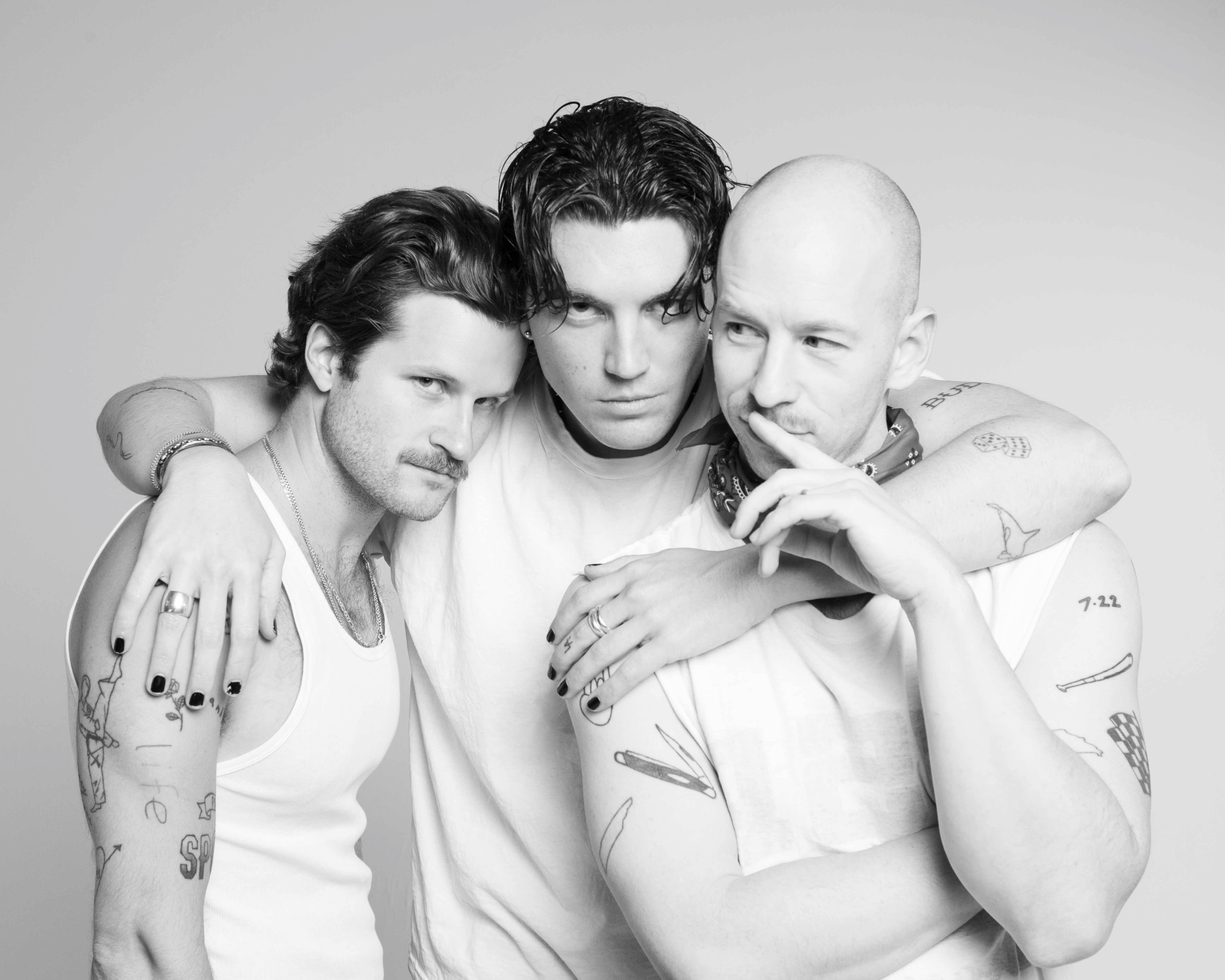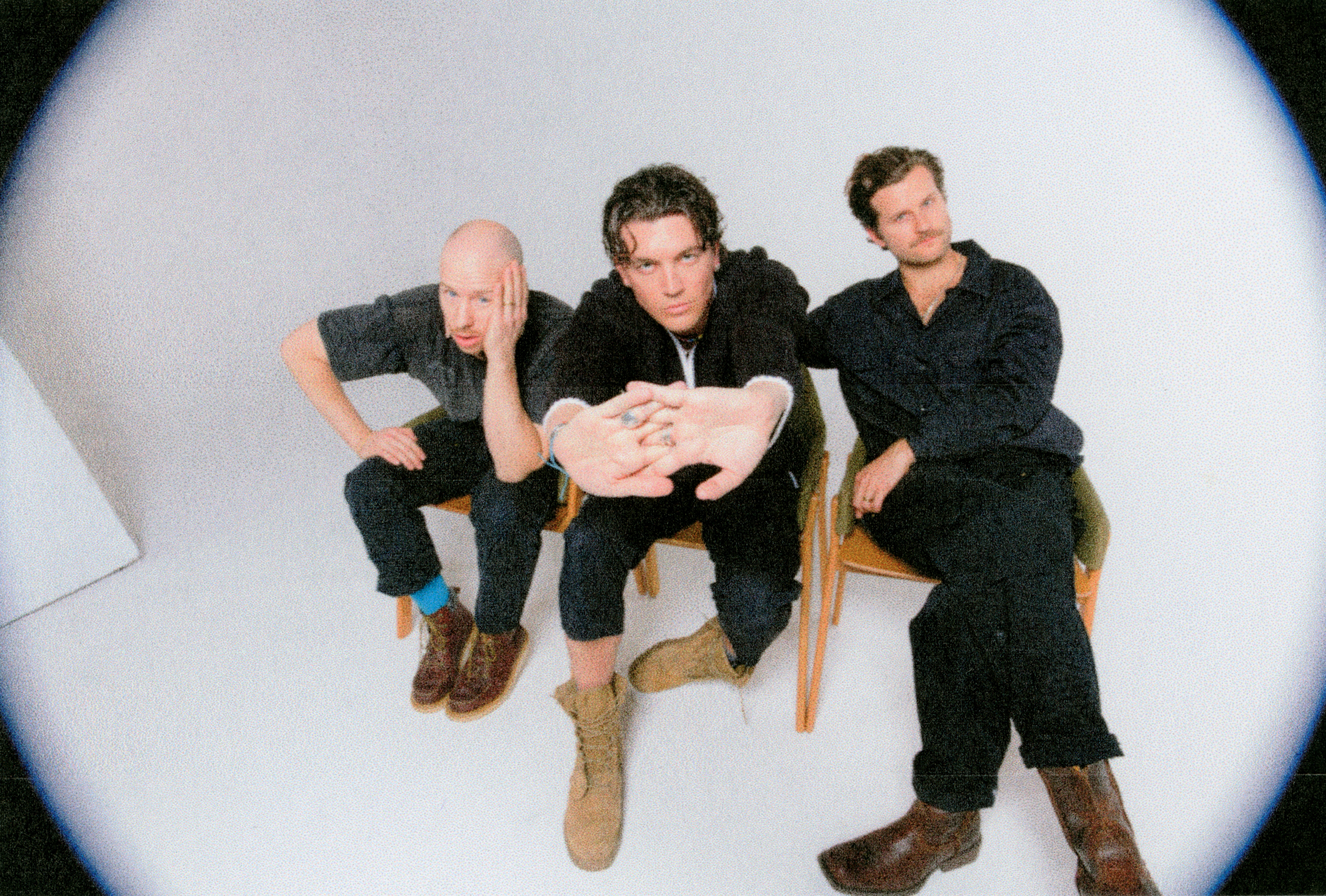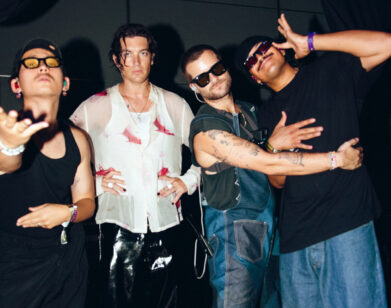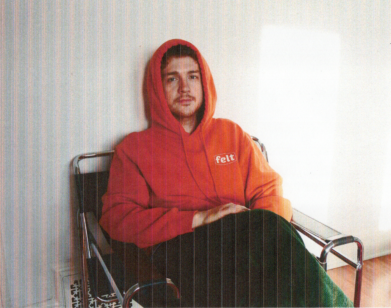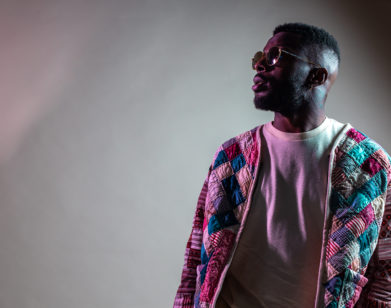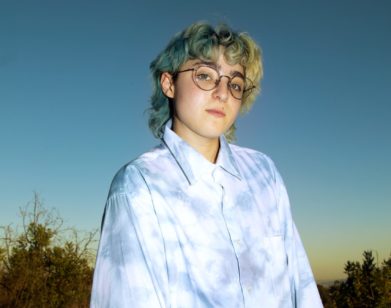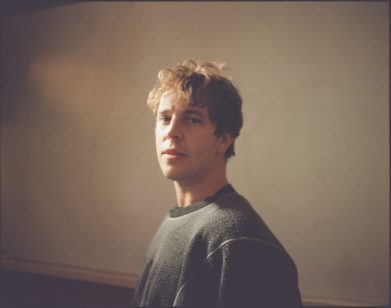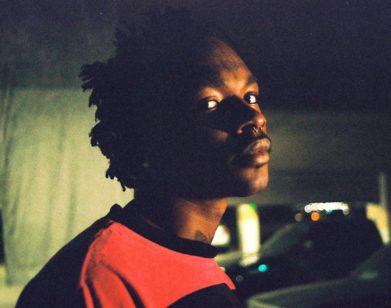add to queue
LANY’s Paul Jason Klein Is Listening to Post Malone, Coldplay, and So Much John Mayer
This is “Add to Queue,” our attempt to sort through the cacophony of music floating in the algorithmic atmosphere by consulting the experts themselves. Our favorite musicians tell us about their favorite music—the sad, the happy, the dinner party-y, the songs they want played at their funeral. In this edition, we speak with Paul Klein, the frontman of the hot boy-meets-soft boi band LANY (LA + NY), on the occasion of their latest album mama’s boy. This is the band’s third record since their inception in 2014. The bandmates—Klein, Charles Leslie “Les” Priest, and Jake Clifford Goss—met in Nashville while studying music at Belmont University. Though the band is no longer a small-town indie act thanks to the success of its previous projects—especially the quintessential 2018 heartbreak album Malibu Nights—their heart remains where the home is. mama’s boy is an ode to the journey behind every restless urban cowboy. There are timeless songs like “sad,” about the nostalgic and ever-resonating feeling of wanting to make a past lover jealous; there’s also timely songs like “if this is the last time,” where Klein sings to his family about growing up—a fitting message for an unlikely moment. As the 32-year-old Oklahoma-native describes it, mama’s boy should feel like “a big fat warm blanket or a hug.” Below, from his home in California, Klein opened up about LANY’s growth, being a proud mama’s boy, and the music that built him—hint: he’s a huge John Mayer fan.
———
ERNESTO MACIAS: I’ve been listening to the album and it’s really great. It’s emotional, it’s a lot of things. Tell me about your journey with music—the road that it took you to get to the release of mama’s boy?
PAUL KLEIN: I was like four years old, and I remember my mom telling me that I was going to start piano lessons. I felt like in that moment, my life was over in a sense. I was classically trained for 13 years and then I started studying jazz in middle school, because my granny was in a nursing home and I figured out that they would pay me $35 an hour to sit there and play jazz standards for the old people in the nursing home. I wound up going to music school and I just started writing songs. I think I wrote my first song to ask this girl that I liked in high school to go to prom with me.
MACIAS: What was the song called?
KLEIN: I’m sure it was so bad. Growing up, going to classical piano competitions on the weekend was not something you wanted anyone to know. It was not cool. Suddenly, you write a song for a girl and they like you back for the first time in your life.
MACIAS: How is this album different from your past projects?
KLEIN: In the last few years, I was obsessed with trying to be the biggest band in the world. That’s cool, but it’s so subjective. One thing that I feel super confident in saying is that we are definitely the most improved band on the planet. Mama’s boy is without a doubt our best album yet. Malibu Nights was an incredible step forward for us. After putting that album out, we were in rooms three-times bigger than we were before. But at the same time, that was a very unilateral, one-dimensional album. It was a break-up album. But mama’s boy has so much flavor on it. I feel confident in saying that there’s at least one song on that album for everyone around the world.
MACIAS: How did you arrive at the album title?
KLEIN: In the past, we may have lacked geographical identity. The Beatles, Liverpool, U2, Ireland, Oasis, Manchester. LANY was like a “quasi-California indie-pop thing with West Coast vibes.” But I’m from Oklahoma, Jake’s from Arkansas, Les is from Missouri. There’s nothing very special about anything about where we’re from or who we are. That’s something I think a lot of people can relate to. Very few people in L.A. are actually born and bred there. I wanted to do something that felt like a nod to where we’re from, but without being too on-the-nose, without literally calling it Heartland or calling it Middle of Nowhere. Being a mama’s boy has a real American ring to it. I thought it was perfect—all three of us are big mama’s boys.
MACIAS: For sure. I’m from Texas, so I can definitely relate to that energy. What is the last song that you listened to?
KLEIN: “Give Me Your Fire, Give Me Your Rain” by the Paper Kites. They’re a great band, you should listen to them.
MACIAS: Do you have a song that you always sing to, no matter where you are or what you’re doing?
KLEIN: I would probably say “Gravity” by John Mayer.
MACIAS: I haven’t heard that song in a minute, that’s a good one.
KLEIN: You should listen to the drums on that album. I don’t know if you get geeked out by the sound of things, but the way they mic’d those drums specifically on that album is breathtaking. It’s insane.
MACIAS: Who was the earliest musician to influence you?
KLEIN: John Mayer was it for me, which is cool because we were able to go on tour with him and we played seven arenas with him. Now we text and he gives me feedback. It’s unbelievable. Most days, I still can’t wrap my head around it. I remember being in 7th grade, honestly maybe earlier, when I heard “No Such Thing” for the first time. It was the Room for Squares album, and it was really like the first album my mom and I could bond over. She liked it too, so we just always put it on in the car.
MACIAS: Speaking of family, how important was the idea or the theme of family and home in this album?
KLEIN: The title of the album clearly is referencing our moms, and then we have a song called “If This Is the Last Time,” which is specifically about saying bye to your mom, your dad, but it could apply to grandparents or loved ones. It’s important, but it’s not indicative of the entire album by any means. There are quite a few references, but it’s not like, “Hey, I wrote 14 songs about the inner workings and nuances of my family dynamic.”
MACIAS: Where was your first concert and who was it, if you remember?
KLEIN: I‘m going to sound like the biggest John Mayer fan ever, but it was John Mayer in Dallas. I think it was called the Smirnoff Amphitheater. Sat on the back grass and had a spiritual experience, I guess.
MACIAS: Do you remember the first music video that left an impression on you?
KLEIN: A song called “Boston” by Augustana. I don’t know if it’s real or CGI, but thousands of pianos wash up on the beach. The whole band performs in the water and the waves are just wrecking them. That was actually my main reference for our “Malibu Nights” music video. I’ll never forget seeing that music video and being floored.
MACIAS: What song always puts you in a happy mood?
KLEIN: “Every Teardrop is a Waterfall” by Coldplay.
MACIAS: What song makes you feel safe?
KLEIN: “Will You Be There” by Michael Jackson. That ascending melody that just never stops, the drums, they just roll and roll. That song is so amazing.
MACIAS: What songs or artists would you put on a playlist for a post-breakup?
KLEIN: Oh, god. I don’t really ever want to listen to anything or eat anything or do anything. I’m going to say I would probably put on something like Drake, because I wouldn’t want to sit there and get sadder. I’m such a Drake stan, to be honest. If you’re working out or you want to get fired up, listen to If You’re Reading This It’s Too Late.
MACIAS: What about a getting high playlist?
KLEIN: We’d put on like Travis Scott, maybe a little Postie [Post Malone], too. I love throwing Postie in the mix. He’s got so many bangers.
MACIAS: He grew on me a lot. I wasn’t so about it, and then I gave him a couple of spins and I was like, “I get it.”
KLEIN: He’s such a music guy, too. His musical knowledge, background, and library is really impressive. He’s well versed and well-cultured.
MACIAS: Do you have a Post Malone song that you go back to?
KLEIN: This is a rare cut, but “Candy Paint.” It’s a low-key banger that deserves more respect.
MACIAS: What about a song that takes you back to your youth?
KLEIN: “Ocean Avenue” by Yellowcard. I was so into that pop-punk movement. When you break down those songs, they’re incredible. Especially some of those Dashboard Confessional songs, just absolute poetry. To me, Yellowcard, specifically their first album, Ocean Avenue, which had “Only One,” “Empty Apartment,” and “Way Away”—that album was crazy.
MACIAS: If there was a song that you could play for the entire world and you think it would save the world, which one would it be?
KLEIN: It would be something by Oasis, whether it be “Wonderwall,” or “Don’t Look Back in Anger,” or “Champagne Supernova.” I’d just pick some anthemic singalong. Oasis did that really, really well.
MACIAS: If you could collaborate with anyone dead and alive, who would it be?
KLEIN: As far as collabing, I’m not entirely sure, but somebody I would jwant to have a music mentorship from would be Chris Martin. I’ve watched him for so long. Piano was never cool, but Alicia Keys’s MTV Unplugged performance was the first time I saw somebody on the piano and thought, “Oh, shit. Maybe piano is cool.” Chris Martin solidified that for me.
MACIAS: When people listen to the new album from beginning to end, what do you hope that they take away from these songs?
KLEIN: I think that we went to the studio last week, because we got some vinyl pressed of mama’s boy and we needed to listen back. There’s a lot of peaks and valleys and it ebbs and flows. One thing I’m excited about, we wrote all these songs in 2019, so we had no idea what 2020 was going to look like, but there’s not really that many sad songs, or if any. There’s a song called “Sad,” but it’s not really sad.
MACIAS: A personal favorite. Given, I went through a breakup through quarantine, so just the sentiment of the song hits different. But overall, as a message, it really resonates.
KLEIN: Is it? There are 47 versions of that song, by the way. We landed on the best one, but that song was such a challenge. This album is full of hope, light, and good energy. It should just feel like a big fat warm blanket.

